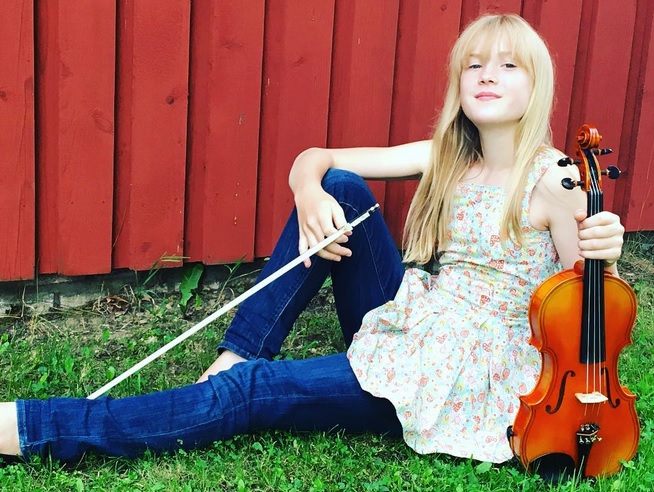Welcome to the world of Estella Elisheva

Practicing violin: Playing Hevenu Shalom Aleichem
A post shared by Estella Elisheva (@estella.elisheva) on
Shalom Aleichem (Hebrew: שָׁלוֹם עֲלֵיכֶם, “Peace be upon you”) is a traditional song sung by Jews every Friday night upon returning home from synagogue prayer. It signals the arrival of the Jewish Sabbath, welcoming the angels who accompany a person home on the eve of the Sabbath.
Sources
This liturgical poem was written by the kabbalists of Safed in the late 16th or early 17th century. A complete survey of extant manuscripts, compiled by Chaim Leiberman, is available in Kirjath Sepher vol. 38–9.
According to a homiletic teaching in the Talmud, two angels accompany people on their way back home from synagogue on Friday night—a good angel and an evil angel. If the house has been prepared for the Shabbat (“the lamp has been lit, the table set, and his couch spread”), the good angel utters a blessing that the next Shabbat will be the same, and the evil angel is forced to respond “Amen”. but if the home is not prepared for Shabbat, the evil angel expresses the wish that the next Shabbat will be the same, and the good angel is forced to respond “Amen”.
The custom of singing Shalom Aleichem on Friday night before Kiddush is now nearly universal, even though certain rabbinical authorities have expressed misgivings. The 18th century Rabbi Jacob Emden in his Sidur Beth Ya’aqov prayer book pointed out many problems regarding this song (addressing requests to angels, expressions that do not make sense, etc.). A similar attitude to the singing of Shalom Aleichem is attributed to Rabbi Elijah, the Vilna Gaon.
Melodies
Many different melodies have been written for Shalom Aleichem.
The slow, well-known melody for the song was composed by the American composer and conductor Rabbi Israel Goldfarb on May 10, 1918 while sitting near the Alma Mater statue in front of Low Memorial Library at Columbia University, and first published later that year as “Sholom Alechem—שָׁלוֹם עֲלֵיכֶם” in Friday Evening Melodies by Israel and his brother Samuel. The famous Goldfarb song is often presumed to be a traditional Hasidic melody. I. Goldfarb wrote in 1963, “The popularity of the melody traveled not only throughout this country but throughout the world, so that many people came to believe that the song was handed down from Mt. Sinai by Moses.” In the Preface to “Friday Evening Melodies” the composers articulated the goal of avoiding the extremes of both the free-form emotive Eastern European musical liturgical style and the classical Western European musical structure of “Israel Emancipated.”
Lately, a modern, exuberantly joyful version of this melody has been popularized by Idan Yaniv and Kinderlach.
As one of her last acts, Debbie Friedman shared her beautiful and haunting “Shalom Aleichem” with Rabbi Joy Levitt. Friedman believed it was this song that would become her legacy.
The Faster Common Traditional Melody was composed by Rabbi Shmuel Brazil.
Words
The lyrics, in Hebrew, are as follows:
שָׁלוֹם עֲלֵיכֶם מַלְאֲכֵי הַשָּׁרֵת מַלְאֲכֵי עֶלְיוֹן
מִמֶּלֶךְ מַלְכֵי הַמְּלָכִים הַקָּדוֹשׁ בָּרוּךְ הוּא
בּוֹאֲכֶם לְשָׁלוֹם מַלְאֲכֵי הַשָּׁלוֹם מַלְאֲכֵי עֶלְיוֹן
מִמֶּלֶךְ מַלְכֵי הַמְּלָכִים הַקָּדוֹשׁ בָּרוּךְ הוּא
בָּרְכוּנִי לְשָׁלוֹם מַלְאֲכֵי הַשָּׁלוֹם מַלְאָכֵי עֶלְיוֹן
מִמֶּלֶךְ מַלְכֵי הַמְּלָכִים הַקָּדוֹשׁ בָּרוּךְ הוּא
☼
צֵאתְכֶם לְשָׁלוֹם מַלְאֲכֵי הַשָּׁלוֹם מַלְאָכֵי עֶלְיוֹן
מִמֶּלֶךְ מַלְכֵי הַמְּלָכִים הַקָּדוֹשׁ בָּרוּךְ הוּא
The song in Hebrew is transliterated as follows:
Shalom aleichem malachei hash-sharet malachei Elyon,
mi-melech malachei ham-melachim haq-qadosh Baruch Hu.
Bo’achem le-shalom malachei hash-shalom malachei Elyon,
mi-melech malachei ham-melachim haq-qadosh Baruch Hu.
Barchoni le-shalom malachei hash-shalom malachei Elyon,
mi-melech malachei ham-melachim haq-qadosh Baruch Hu.
Tzeitechem le-shalom malachei hash-shalom malachei Elyon,
mi-melech malachei ham-melachim haq-qadosh Baruch Hu.
